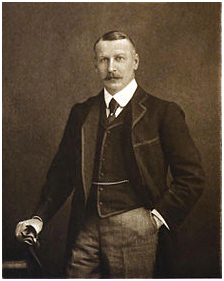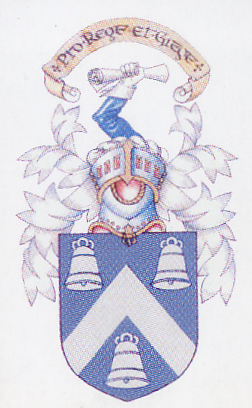|
Former Pupil Biographies
Robert Marshall (1863 -
1910)
Dramatist, Writer of the golf classic The Haunted
Major, also known as The Enchanted Golf Clubs.
| Robert Marshall's father was a magistrate in
Edinburgh, who sent his son to school in St Andrews and afterwards to the
University of Edinburgh, where he read Greek, Latin and English
literature. His father's death curtailed his studies and he spent some
time as the articled pupil of his uncle, a solicitor but he tired of this
and chose to enlist in the 71st Highland Light Infantry, his brother
having graduated from Sandhurst with distinction. After three years service in the ranks, he was given
a lieutenant's commission in the Duke of Wellington's West Riding
Regiment, at that time stationed in the Bermudas. While on guard duty on
Agar's Island, he used his off-duty time to write his first play The
Subaltern, which was produced by The Amateur Dramatic Club of Bermuda for
which he also acted and painted sets. |
 |
The regiment then moved to Canada where Marshall
wrote a three-act play called Strategy which was produced in Halifax,
being played by a first-class company from New York. His next piece was a
burlesque entitled Guy Fawkes with music composed by the regiment's
band-master.
The regiment then moved to Barbados where he again
had great success with Guy Fawkes. While in Barbados, he wrote a play
about the Jacobite rising of 1745–1746 entitled 1746 but although it was
bought by an agent, it was never produced.
In 1893, he was posted to the Cape Colony as adjutant
to Sir William Gordon Cameron, a post which he held for over a year. While
stationed at the Cape Town Castle, he wrote a play entitled The Great
Day which was to have been produced by George Alexander but F. Pigott,
the Examiner of Plays (censor), objected to it and so this never occurred.
A few months later his one-act play The Shades of Night was produced at
the Lyceum Theatre.
He was then posted to the Colony of Natal where he
became aide-de-camp to Sir Walter Hely-Hutchinson, Governor of Natal. When
his first important play His Excellency the Governor succeeded, he
resigned and took playwriting as his profession. He had two other big
successes, The Second in Command and The Duke of Killiecrankie. With
the latter, he rescued from imminent financial disaster one of the best
known managers in London. He died at the age of forty-seven.
The 'Old Boys Chronicle' in the
Madras College Magazine
for June 1905
reports:
"The visit that has been made to Edinburgh by the skilful dramatic
company playing 'The Duke of Killiecrankie' deserves to be noted
here for the sake of its brilliant author, Captain Robert Marshall, an
old Madras boy. Captain Marshall rates as one of the foremost dramatists
of his day. His first important play, 'His Excellency the Governor'
attained a remarkable popularity, and this was well sustained by 'The
Second in Command'. His new piece is greatly lauded by the
critics. Captain Marshall's plays are always witty, cleverly
constructed, and happy in their characterization. "Old boys" of twenty
years ago will remember him well as a very pleasant and popular
schoolboy, and an excellent amateur actor. "
The
'Old Boys Chronicle' in the
Madras College Magazine for
Easter 1911
reported:
"By the lapse of time the elder generation of 'Old Boys' is being
inevitably thinned. Some time ago a distinguished former pupil of the
College passed way in the person of Captain Robert Marshall.
Captain Marshall was a native of Edinburgh, born in 1863. He and
his brothers were boarders with Dr. Fogo while attending 'The Madras'.
When at school the brother was esteemed the smarter and more literary of
the two.
Latterly Robert attended Edinburgh University, and was a student of
Blackie, Sellar and Mason. In his student days he was keen on amateur
theatricals. He first tried the law as a profession, but not liking it,
he enlisted as a private in the Highland Light Infantry. Then he was
transferred to the Duke of Wellington's Regiment, with which he served
for some time in the West Indies. Of this regiment he was a captain. His
military duties subsequently took him to Cape Town, where he held a
staff appointment in 1893, and later to Natal, where he acted as
Aide-de-Camp to the Governor, Sir Walter Hely-Hutchinson. He retire in
1898. His first acted play was Shades of Night, in one act, which
was produced by Mr. Forbes Robertson at the Lyceum in 1896. Then
followed His Excellency the Governor which, with its pleasant
story and sparkling dialogue, at once took the public fancy, and drew
crowds to the Court Theatre for many months. Among his other works were
The Broad Road (1898), A Royal Family (1899), The Noble
Lord (1900), The Second in Command (1900) - which had a great
run at the Haymarket - There's Many a Slip (1902), The
Unforeseen (1902), The Haunted Major (1902), The Duke of
Killiecrankie (1904), Everybody's Secret (1904), The Lady
of Leeds (1905), The Alabaster Staircase (1906) and The
Outsider. The Second in Command was perhaps Captain
Marshall's best play. In it the dramatist provided Mr. Cyril Maude with
a part - that of the courageous Binks - which will be remembered as one
of the actor's most delightful creations. Captain Marshall during the
last year of his life was engaged on a play for Mr. Maude, but bad
health prevented him from finishing it. As a dramatist, Captain Marshall
was blessed with imagination and with the gift of writing bright and
witty dialogue, and his work was always wholesome and amusing."
|

